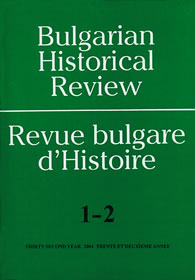Българската православна църква срещу расизма и антисемитизма в навечерието и по време на Втората световна война
The Bulgarian Orthodox Church Against Racism and Anti-Semitism in the Eve and During World War Two
Author(s): Svetlozar EldarovSubject(s): History
Published by: Институт за исторически изследвания - Българска академия на науките
Summary/Abstract: Racism is the most fruitful ground for anti-Semitism. Alien to the spirit and traditions of the Bulgarian people it appeared in Bulgaria in 1920s–1930s as a fashionable imitation of the racist theory of Nazism and the eugenic teaching of Bolshevism. The first to raise voice against the dangerous effects of this event was the Jewish community in the country through an inquiry among the Bulgarian intellectuals. In 1938–1940 this problem became an object of a serious scientific debate. The Bulgarian Orthodox Church did not interfere formally or with representatives of its own in the polemics but Christian anthropology totally denies any racial or ethnic inequality. Christian pacifism and solidarity together with the incompatibility of religion and church with the political theories and practices of Fascism, Communism and Bolshevism were the solid foundation of the opposition of the Bulgarian Orthodox Church to the anti-Jewish laws in Bulgaria and the Law for the Defense of Nation (1940) in particular. The same firm basis turned the Metropolitan of Sofia Stefan into the main protagonist of the struggle against the deportation of the Jews from Bulgaria (1943). The denial of racism and anti-Semitism form the view point of Christian teaching and morality was the strongest argument which the supreme Church administration advanced before the state authority. From the depth of its doctrine to the external forms of its manifestation the Bulgarian Church was the most convinced, irreconcilable and consistent opponent of any forms of racial or national suppression. Although lacking the veneer of parliamentary debates or the clamour of street demonstrations, the Christian doctrine and morality possess pervasive internal power, which has been accumulating for centuries on end in the people’s consciousness. That is why when asserting that the greatest merit for the saving of the Bulgarian Jews goes to the Bulgarian people this is true not because of certain abstract populism or invented social demagogy but by force of his Christian values.
Journal: Bulgarian Historical Review / Revue Bulgare d'Histoire
- Issue Year: 2006
- Issue No: 1-2
- Page Range: 240-263
- Page Count: 24
- Language: Bulgarian
- Content File-PDF

